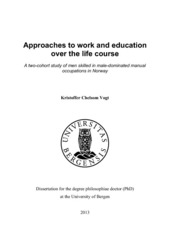| dc.description.abstract | This thesis explores the approaches to work and education of men skilled in maledominated manual occupations in Norway. Its focus is on how their approaches to work and education have 1) changed over historical time and 2) developed over the life course. An empirical exploration of these questions provides the background for a number of contextualized contributions to wider debates about work and education in society. The study is based on a postal survey (N=144) and 28 life story interviews, and compares two educational cohorts (skilled 1968-78 and 1978/79). By making use of life story interviews in a comparative cohort design, the project is able to relate historical changes in the relevant period (1960s to early 2000s) to developments in the lives of individuals. The analysis shows different ways in which family background has influenced the school-to-work transitions of men skilled in male-dominated manual occupations in Norway. The cohort comparison demonstrates how this influence has become more subtle than it used to be. Practices of household work are found to be important for these men’s approaches to work and education. It was for instance the context for the cultivation of a broad competence for entering into dialogue with objects. More generally, their approaches to work and education are found to have developed over the life course through a continual interplay of work experiences, labour market actions and structural conditions. The points that turned out to distinguish the cases from one another (with respect to their approaches to work and education) were not hinged at the level of specific occupations. The fact that they did the same type of work, object based work, was more important. As a whole, this thesis indicates that a process of formalization (expressed by an increased emphasis on tertiary education), has implications for the balance between types of work in society. The analysis suggests that definitions of talent and merit are becoming increasingly narrow to the disadvantage of those talented at object based work, as more and more opportunities and privileges are being turned into rewards for school performance. | en_US |
